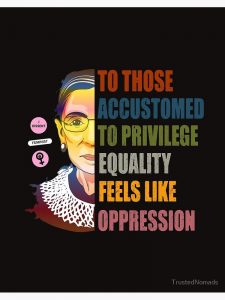Reading Time: 5 minutes
Suchismita tells us about the basics of feminism. An exclusive for Different Truths.
 The word ‘feminism’ is no new in the world of movement. We are pretty much known to this word. The simplest definition of feminism refers that a movement, which is set on a definite ideology and fosters the rights of women in the arenas of political, social and economical equity. Feminists are those who come forward to voice about the rights of women. They believe that men and women are no different and women should be equally treated like men and given equal opportunities to prove themselves as the equally deserved citizens of a country.
The word ‘feminism’ is no new in the world of movement. We are pretty much known to this word. The simplest definition of feminism refers that a movement, which is set on a definite ideology and fosters the rights of women in the arenas of political, social and economical equity. Feminists are those who come forward to voice about the rights of women. They believe that men and women are no different and women should be equally treated like men and given equal opportunities to prove themselves as the equally deserved citizens of a country.
Feminists are those who come forward to voice about the rights of women. They believe that men and women are no different and women should be equally treated like men and given equal opportunities to prove themselves as the equally deserved citizens of a country.
Reasons for Feminism
The feminism movement has fought for different issues in the past century such as, right to vote, right to work, right to live with the freedom and right to survive without any kind of violence. The main mantras of feminism are to uplift the neglected and unprivileged women of a nation for building a better society. A society that offers equal opportunities to its women is on the right path to achieve all the desired goals for the betterment of a nation. The main reasons why feminism come to the light are the regressive nature of the society against women, suppressing women’s voice to fight for their equality, demeaning women’s dignity and snatching the minimum privileges to live with freedom.
Three Waves of Feminism
The first wave of feminism arose in the late 19th and early 20th centuries. The first wave feminists had their own particular agenda to voice about, which was to fight for the right to vote. In that era, a country’s half population could vote and that was made up of only men. Women had no options to vote or let their democratic voice come out in front of the entire world.
Though the movement got success after a lot of struggles and hardships, there are still some countries where women face a whopping amount of difficulties while voting even after our celebration of 100 years of women voting. Such countries are Saudi Arabia, Afghanistan, Pakistan, Oman, Qatar, Nigeria, Uganda, Kenya, Zanzibar etc.
Though the movement got success after a lot of struggles and hardships, there are still some countries where women face a whopping amount of difficulties while voting even after our celebration of 100 years of women voting. Such countries are Saudi Arabia, Afghanistan, Pakistan, Oman, Qatar, Nigeria, Uganda, Kenya, Zanzibar etc. Women in these countries still have to face a lot of societal bars while clearing their voice in support of voting which directly provides nutrition to the patriarchal ideologies.
The second wave of feminism came into the light in between 1960 and 1970. They had a much wider vision than the first wave feminists in terms of implementing equality in society. They campaigned for the right of equal pay, the right to live free from the physical and sexual violence and reproductive rights like access to contraception and safe abortion, etc. As people were already aware of the first wave movement, the second one got a huge response from around the world.
The third wave of feminism started after 1990 and continues till today. The third wave feminists are integrated to talk about race, ethnicity and sexual identity. It considers every sphere of women empowerment which needs to come into the broad daylight and to be given the much-needed priority to change the society. They follow the same principals and motives as the second wave.
Famous Feminists of India
The legendary feminists of India whose contribution has been able to bring the change in a greater scale are Savitribai Phule (Indian social reformer & educationist), Tarabai Shinde (Feminist activist), Medha Patkar (Indian social activist), Dr. Vina Mazumdar (Indian academician, Left-wing activist & feminist), Nivedita Menon (Feminist writer, professor of Political Thoughts at JNU), Durgabai Deshmukh (Indian freedom fighter, lawyer, social activist & politician), Manikuntala Sen (Empowerment activist, a political leader of the Communist Party of India), Angelica Aribam (Political & social activist)…
India has always proved to be one of the most pivotal centres of spreading feminism as well as waking up the mass about the significance of women

empowerment in the nation. The legendary feminists of India whose contribution has been able to bring the change in a greater scale are Savitribai Phule (Indian social reformer & educationist), Tarabai Shinde (Feminist activist), Medha Patkar (Indian social activist), Dr. Vina Mazumdar (Indian academician, Left-wing activist & feminist), Nivedita Menon (Feminist writer, professor of Political Thoughts at JNU), Durgabai Deshmukh (Indian freedom fighter, lawyer, social activist & politician), Manikuntala Sen (Empowerment activist, a political leader of the Communist Party of India), Angelica Aribam (Political & social activist), Indira Jaising (foremost Feminist activist & lawyer), Meenakshi Arora (a senior practising counsel at Supreme Court of India), etc. These famous personalities have worked on various issues like child marriages, dowry, sexual violence, equal right for girl in a family, self-defence and several others proactively to change the scenario of our Indian society.
Impact of Feminism in India
The fruitfulness of feminism has been implemented after the independence of India in 1947. Women have come forward for their rights and voiced against injustice from time to time. From the employment sector to health, education and other areas, women are now working with men from shoulder to shoulder. The effect of globalisation has also catalysed the change of women in India.
Mindsets are changing though gradually. When we know our rights, we can fight to achieve them. When we know our values, we can definitely elevate the real meaning of feminism. When the women of today unite to fight against patriarchy, India can definitely hope to provide justice and equality to both men and women in a distant future.
Mindsets are changing though gradually. When we know our rights, we can fight to achieve them. When we know our values, we can definitely elevate the real meaning of feminism. When the women of today unite to fight against patriarchy, India can definitely hope to provide justice and equality to both men and women in a distant future. It is not justifiable to say that everyone should idolise the principles of feminism but definitely can support the righteous motives to serve equity to the women of the nation as well as curb the practice of patriarchy from the roots of India.
Pictures from the Internet
















Awesome, well penned, you are one of the best emerging Writers, I’ve crossed paths with, god bless you Suchismita, may you achieve lots of success and prosper in life